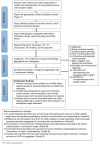Parent and carer experiences of health care professionals' communications about a child's higher weight: a qualitative systematic review
- PMID: 39844510
- PMCID: PMC11974632
- DOI: 10.11124/JBIES-24-00056
Parent and carer experiences of health care professionals' communications about a child's higher weight: a qualitative systematic review
Abstract
Objective: The objective of this systematic review was to identify, critically appraise, and synthesize the best available qualitative evidence on parent and carer experiences of communications from health care professionals concerning their child's higher weight.
Introduction: Public discourse on obesity has shifted in recent years and created pressure to change the way that weight is discussed in health care. A child's higher weight can be a sensitive issue to discuss in health care, but successful communication with parents can increase parental compliance with treatment and improve overall family welfare. It is, therefore, important to explore how parents and carers experience the communication about children's higher weight to ensure effective, up-to-date, and ethical counseling on childhood obesity.
Inclusion criteria: This qualitative review included studies that focused on the experiences of parents or carers of children (birth to 12 years) with a higher weight who received verbal or written communication from health care professionals about their child's weight.
Methods: The following databases were systematically searched from 2010 onward: MEDLINE (EBSCOhost), CINAHL (EBSCOhost), PsycINFO (Ovid), Scopus, LILACS, and the Finnish health sciences database MEDIC. ProQuest Dissertations and Theses (ProQuest) was searched for unpublished articles. The search was conducted in July 2022 and updated in October 2023. No country or language limits were applied. A manual search was used to supplement the database searches. Study selection including title and abstract screening, full-text screening, critical appraisal, and data extraction were performed by 2 reviewers. The research findings were categorized and aggregated into synthesized findings. The synthesized findings were assigned confidence scores, and categories and finalized synthesized findings were agreed upon by all reviewers.
Results: The 33 included studies varied in qualitative study design and methodological quality. There were over 900 eligible participants (parents and carers) and 147 unequivocal and credible research findings. The research findings yielded 8 categories and 3 synthesized findings with low confidence scores. The synthesized findings were as follows: i) Parents receiving communication on a child's higher weight experience strong feelings that can affect their parenting; ii) A health care professional's active and individual communication, with the sensitive use of words, creates a good communication experience for parents; and iii) Parents want to receive information about the child's higher weight that is useful to them and is based on an acceptable weight estimation.
Conclusion: Although confidence in the synthesized findings is low, this review indicates that communication from a health care professional on a child's higher weight should meet the parents' expectations and the family's situation and needs. Having the skills to deal with heightened emotions, using expertise and empathy as a professional, and providing appropriate information create a good communication experience for parents. In addition, parents' desire to protect their child and the strengthening of the parenting experience should be acknowledged to conduct safe communication.
Supplemental digital content: A Finnish-language version of the abstract of this review is available at: http://links.lww.com/SRX/A92 .
Keywords: childhood obesity; experience; health care professionals; parents/carers; weight communication.
Copyright © 2025 The Author(s). Published by Wolters Kluwer Health, Inc. On Behalf of JBI.
Conflict of interest statement
The authors declare no conflict of interest.
Figures
Similar articles
-
Parent and carer experiences of health care professionals' communication about childhood obesity: a qualitative systematic review protocol.JBI Evid Synth. 2023 Feb 1;21(2):401-406. doi: 10.11124/JBIES-22-00017. JBI Evid Synth. 2023. PMID: 36059227 Free PMC article.
-
Experiences of parents and carers in managing asthma in children: a qualitative systematic review.JBI Database System Rev Implement Rep. 2019 May;17(5):793-984. doi: 10.11124/JBISRIR-2017-004019. JBI Database System Rev Implement Rep. 2019. PMID: 31090652
-
Parental experiences of caring for their preschool children after declining vaccines: a qualitative systematic review.JBI Evid Synth. 2025 Feb 1;23(2):244-332. doi: 10.11124/JBIES-23-00405. Epub 2025 Jan 14. JBI Evid Synth. 2025. PMID: 39807617
-
Healthcare users' experiences of communicating with healthcare professionals about children who have life-limiting conditions: a qualitative systematic review protocol.JBI Database System Rev Implement Rep. 2015 Nov;13(11):33-42. doi: 10.11124/jbisrir-2015-2413. JBI Database System Rev Implement Rep. 2015. PMID: 26657462
-
Communication of children's weight status: what is effective and what are the children's and parents' experiences and preferences? A mixed methods systematic review.BMC Public Health. 2020 Apr 28;20(1):574. doi: 10.1186/s12889-020-08682-w. BMC Public Health. 2020. PMID: 32345274 Free PMC article.
References
-
- Jangland E, Gunningberg L, Carlsson M. Patients’ and relatives’ complaints about encounters and communication in health care: evidence for quality improvement. Patient Educ Couns 2009;75(2):199–204. - PubMed
-
- Borrelli B, Tooley EM, Scott-Sheldon LAJ. Motivational interviewing for parent-child health interventions: a systematic review and meta-analysis. Pediatr Dent 2015;37(3):254–65. - PubMed
-
- Weghuber D, Khandpur N, Boyland E, Mazur A, Frelut ML, Forslund A, et al. Championing the use of people‐first language in childhood overweight and obesity to address weight bias and stigma: a joint statement from the the European‐Childhood‐Obesity‐Group (ECOG), the European‐Coalition‐for‐People‐Living‐with‐Obesity (ECPO), the International‐Paediatric‐Association (IPA), Obesity‐Canada, the European‐Association‐for‐the‐Study‐of‐Obesity Childhood‐Obesity‐Task‐Force (EASO‐COTF), Obesity Action Coalition (OAC), The Obesity Society (TOS) and the World‐Obesity‐Federation (WOF). Pediatr Obes 2023;18(6):e13024. - PubMed
-
- Puhl RM. What words should we use to talk about weight? A systematic review of quantitative and qualitative studies examining preferences for weight‐related terminology. Obes Rev 2020;21(6):e13008. - PubMed
Publication types
MeSH terms
LinkOut - more resources
Full Text Sources
Medical



